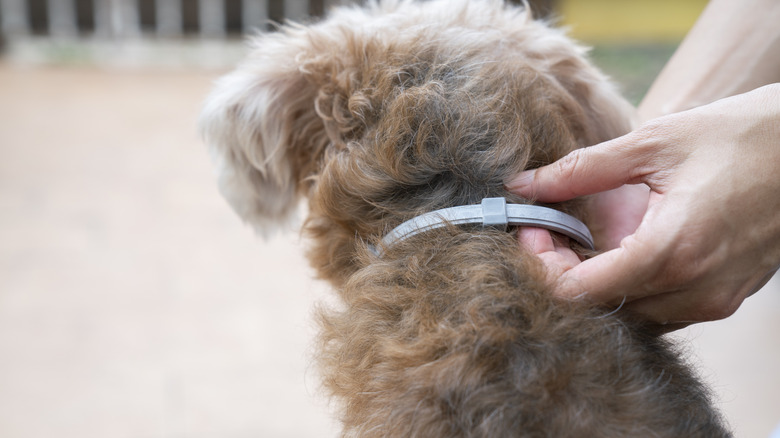You Should Bring A Flea Collar On Your Next Camping Trip. Here's Why
Camping enthusiasts understand the allure of the great outdoors, but alongside nature's beauty often come unwanted pests, which can quickly turn a camping trip into an itchy and uncomfortable experience. Beyond just your wilderness experience, some encounters with insects like ticks can lead to long-lasting negative health effects. Fortunately, there's a simple and effective solution: flea collars.
Flea collars are designed to release active ingredients that repel and sometimes kill fleas, ticks, and even other insects like mosquitoes. These collars are typically made of plastic infused with insecticidal compounds such as insect growth regulators (IGRs) or insecticides. When worn by pets, flea collars gradually release these active ingredients onto the animal's fur, creating a protective barrier against pests. When placed in a space like the corner of your camp tent, they will release these chemicals into the nearby environment, repelling pests from the area.
Most flea collars provide long-lasting protection, making them ideal for extended camping trips and repeated use. Unlike other pest control methods that require frequent reapplication, flea collars can provide continuous protection for several months. This convenience factor enhances their appeal for campers seeking hassle-free pest control solutions.
Scatter flea collars around your tent and campsite
To maximize the effectiveness of flea collars at campsites, strategic coverage is essential. Hanging flea collars from tent poles, attaching them to camping gear, or placing them around the perimeter of the campsite can create a protective barrier that deters pests from encroaching on human territory. Additionally, placing flea collars near entry points and sleeping areas further enhances their efficacy in preventing pests from entering your sleeping quarters. In combination with the correct choice of campsite as well as other bug-repelling scents and ingredients, the flea collar hack could alleviate any concerns you have regarding bugs.
While flea collars are generally safe when used according to the manufacturer's instructions, it's essential to exercise caution when using them, as some flea collars have been reported to be hazardous to pets and humans. Talk to a veterinarian or pest control specialist about the safest and most effective flea collars to use.
Whichever flea collars you choose, ensure that they are securely fastened and away from direct contact with consumables, food, or water sources. Additionally, individuals with sensitivities or allergies to the active ingredients in flea collars should take precautions to avoid adverse reactions. By following these guidelines, campers can enjoy a pest-free camping experience with peace of mind and comfort.

